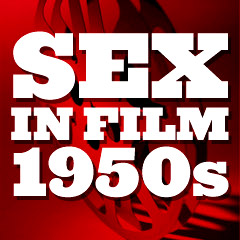
|
History of Sex in Cinema: 1955-1956 |
| Movie Title/Year and Film/Scene Description | |||||||||||

|
How to Be Very, Very Popular (1955) Newcomer Sheree North, an attempted carbon-copy, dumb blonde replacement for the suspended Marilyn Monroe, starred in this Nunnally Johnson comedy opposite star Betty Grable, after the unwilling blonde star walked off and refused to do this picture for Fox. [Note: The studio continued to place North in a series of Monroe-like bombshell roles in the mid-to-late 1950s, including: The Lieutenant Wore Skirts (1956), the musical The Best Things In Life Are Free (1956) and the drama No Down Payment (1957).] The film was a semi-remake of She Loves Me Not (1934), a Paramount Pictures production directed by Elliott Nugent and starring Bing Crosby, Miriam Hopkins and Kitty Carlisle.
San Francisco cabaret-burlesque showgirl Curly Flagg (Sheree North in her first starring role) and fellow chorine Stormy Tornado (Betty Grable in her final film) escaped pursuit by the killer (a bald-headed barber) after witnessing the onstage shooting of fellow headlining dancer Cherry Blossom Wang. With overcoats covering their costumes, they fled on a bus from Chinatown and hid out in College City (near Los Angeles) in an all-male frat house at Bristol College. Curly was accidentally hypnotized into doing a strip tease dance at inopportune moments (whenever she heard the word "Salome"). In one of the film's more talked-about sequences, the college graduation ceremony, the speaker mentioned the Battle of Salamis - and Curly thought she heard "Salome." She stripped off her gray college commencement gown and performed a wild, frenzied and energetic rock and roll dance (bump and grind) to "Shake, Rattle & Roll." It was advertised as "the screen's first Rock 'n' Roll dance scene." |
 Curly Flagg (Sheree North) |
|||||||||

|
Love is a Many-Splendored Thing (1955) Henry King's adaptation of Han Suyin's novel of the same name told of a forbidden, cross-cultural and cross-racial, clandestine romance between two lovers in Hong Kong during China's Communist revolution:
They engaged in conversation after they had gone swimming, and later returned to retrieve their clothes among some rocks - at nighttime:
The Oscar-winning title tune swelled in the background as their two cigarettes merged and ignited. They joined their two cigarettes together as a symbol (his burning cigarette lit hers, symbolic of the sexual consummation of their love -- and sublimation of their passion). |
  Han Suyin (Jennifer Jones) with Mark Elliott (William Holden) |
|||||||||

|
Picnic (1955) Joshua Logan's widescreen Technicolored version of William Inge's Pulitzer Prize-winning play (with a screen adaptation by Daniel Taradash) was a rural romantic drama. It was set during Labor Day in a small Kansas town. It included a slow "mating" dance sequence (to the tune of "Moonglow") on Labor Day weekend at the end of a picnic, between:
It was filmed in basically one-take with a circling camera under colorful Japanese lanterns on a boat dock landing at night, although one cutaway showed two observers commenting on how "graceful" they were together. |
 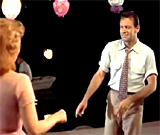  Hal (William Holden) with Madge (Kim Novak) |
|||||||||
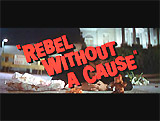
|
Rebel Without a Cause (1955) Director Nicholas Ray's affecting drama Rebel Without a Cause (1955) sympathetically viewed rebellious, restless, misunderstood, middle-class American youth alienated from adults in a Los Angeles suburb. The two main characters both had self-absorbed, hypocritical, indifferent or unloving parents, but found true love with each other: One was Judy (Natalie Wood), a nubile teen with a desperate need to be loved who was first introduced at a police station. In a scene with a hidden incest subtext, she explained to the detective how she was upset about her father (William Hopper) who had resisted and reproached her grown-up sexual maturity. He caused her pain when he labeled her a "dirty tramp" - after she had applied red lipstick and dressed up for him, and then fled the house and was picked up wandering around at 1 am in the morning:
Later, she was seen in her home forcing a kiss from her father at the meal table after he had returned from work: "Daddy?...Haven't you forgotten something?" He mocked her need for affection and humiliated her, embarrassed because she was too old:
She remained upset over her father's reluctance to kiss her and respond to her affection:
When she tried to steal another kiss, her father slapped and chastised her with a reprimanding tone ("Stop that! Sit down!"). Judy fled from her unwelcoming father. After he called her a "glamour puss," she left the house: "This isn't my home." Her mother (Rochelle Hudson) attempted to be reassuring, but admitted that she too didn't know how to help their problematic adolescent daughter: "She'll outgrow it dear, it's just the age...It's just the age when nothing fits." Two other characters in the film's storyline who joined Judy to became a close-knit 'family' of sorts were:
By film's end, due to homophobic attitudes, the 'gay' character (the real 'rebel' of the picture) was killed. |
  Judy (Natalie Wood)    Judy with Father  Plato (Sal Mineo) Idolizing Alan Ladd   Jim (James Dean) with Plato and Judy |
|||||||||

|
The Seven Year Itch (1955) One of film's most iconic and immortal sexual poses was found in this film, The Seven Year Itch (1955) -- The Girl's (Marilyn Monroe as a quintessential, iconic blonde sex symbol) ecstatic famous shot in a white dress flying and billowing up around her knees. She stood spread-legged astride a New York subway vent grating to cool herself during a hot summer, when a train whooshed by underneath her. She smiled as moving trains below blew and lifted her dress upwards above her legs with a rush of air:
She attempted, unsuccessfully, to keep her dress down. Paperback publisher and married Richard Sherman (Tom Ewell), her downstairs neighbor, stood close-by, gaped at her and observed:
Soon, another train came by, and she squealed with child-like delight as it blew her skirt up one more time ("Oh, here comes another one!"). Also The Girl made an innocent statement from her balcony to him about how she kept cool during the hot summer:
|
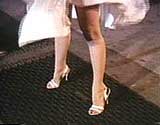  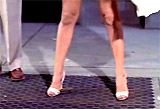 The Girl's (Marilyn Monroe) Subway Grating Scene  "Undies in Icebox" |
|||||||||
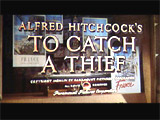
|
To Catch a Thief (1955) The Hitchcock thriller To Catch a Thief (1955) had a few sequences of seductive, passionate kissing in an amorous affair between:
He had escorted her back to her hotel suite - and to his complete surprise, she unlocked her hotel room door, turned - and then after a warm glance into his eyes, she placed her arm around his shoulder and passionately kissed him (the kiss was initiated by her). Without a word, she then backed away, and shut her door. He slowly turned toward the camera with a satisfied smile on his lip-stick stained lips. Later, she invited him to join her for a picnic basket lunch and a drive in her open convertible sports car ("I have my car and a basket lunch with chicken and beer"). After a tense and swervy car ride to evade a pursuit car, she parked at a "lonely and secluded" picnic spot that she had picked out, overlooking the seaside town, where they shared the contents of her picnic basket placed on the front seat. (He sat on the floorboard with his legs out the open passenger door.) Their conversation was particularly saucy and filled with witty double entendres and sexy innuendo. When she passed him a beer, he asked: "You got an opener?" In a famous provocatively-teasing line, Francie made an offer to Robie, referring to the fried chicken (and more) that she had brought on the picnic, causing him to do a double-take:
She was enticed by the possibility that he was a famed jewelry thief, and wanted to join him: "The Cat has a new kitten. When do we start?" When he tightly gripped her arm, she told him: "You're leaving fingerprints on my arm." He pulled her down on top of the picnic basket to 'steal' a kiss from her and make her part of the lunch feast. Another time, while real fireworks exploded through the open doors in the background (over the water in the night sky), other 'sexual' fireworks burst within the room between them - she had invitingly turned out the lights: "If you really want to see the fireworks, it's better with the lights out. I have a feeling that tonight, you're going to see one of the Riviera's most fascinating sights. I was talking about the fireworks....The way you looked at my necklace, I didn't know." Acting as an exploitative predator, she enticed him by displaying her white strapless gown and his main weakness - her sparkling, glistening diamond necklace as the ultimate prize (the word 'diamonds' also referred to her bare decolletage and breasts). She asked if he was staring at her valuable necklace that he was frustratingly "unable to touch." "The thrill is right there in front of you, but you can't quite get it." She stroked her necklace and tantalizingly discussed the diamonds she was wearing. She encouraged him to extol the beauty of both her diamonds -- and her breasts.
He responded: "I've never had a crazier one." She purred: "Just as long as you're satisfied." He remarked about her fake diamond necklace: "You know as well as I do. This necklace is imitation," to which she replied: "Well, I'm not." (They kissed.) The scene climaxed with the white-hot, orgasmic peak of the colorful fireworks exhibition bursting in a vibrant closeup in the night sky, illuminating the intensity of their kiss. The scene was one of filmdom's most blatantly-sexual images.
|
    Frances (Grace Kelly) with John Robie (Cary Grant)   
The Picnic Question: Leg or Breast? |
|||||||||

|
The Ambassador's Daughter (1956) The film market became segmented when studios realized that they could release and distribute differing versions of films for domestic and international audiences. In this UA film made in CinemaScope, in a scene set in a Parisian nightclub, Joan Fisk (Olivia De Havilland), daughter of the US Ambassador to France and American GI Sgt. Danny Sullivan (John Forsythe) watched a stage revue. In the European version, the dancers were topless. |
||||||||||

|
This ground-breaking 'art-house' international film from director Roger Vadim (with no explicit sex and almost no nudity) was a star-making vehicle for international sex symbol and 'sex kitten' Brigitte Bardot, who portrayed 18 year-old, free-spirited, often barefooted orphan Juliette Hardy.
The film was the biggest foreign box-office success of the 50s - its titillating content and positive reception inspired other producers to incorporate nudity into their films to attract audiences, and helped initiate the trend for art house theaters to become adult-film venues as well. It opened with a view of the naked and tanned starlet lying down sunbathing in her backyard and silhouetted against a laundry clothesline with a hanging white bedsheet. The hedonistic, mischievous, freedom-loving and carefree female was the object of attention from much older, wealthy entrepreneur Eric Carradine (Curd Jürgens), and from two brothers: the elder Antoine Tardieu (Christian Marquand) and his naive younger brother Michel (Jean-Louis Trintignant). Although she reluctantly accepted a marriage proposal from Michel, the impetuous and reckless Juliette needed to be rescued by Antoine when her motorboat caught fire out on the water. After enticing him with an unbuttoned, soaking wet, braless one-piece shirt/dress, Antoine was rewarded for saving her with love-making tryst on the beach (conveyed by a before/after shot). In the conclusion, the film featured the erotic scene of a desperate Juliette madly dancing the mambo barefooted in a bar with her open green skirt flashing her black panties. A jealous and angry Michel, with a gun in his possession, found her there and could not stop the disobedient Juliette from being provocative in public. When Eric stepped into the middle of the conflict, he was superficially wounded by a gunshot, and needed to be driven by Antoine to be treated by a surgeon-doctor in Nice. (During their drive, Eric told Antoine about the dangers of remaining in Saint Tropez with Juliette: ("That girl is made to destroy men.") The last view in the film was of Juliette and Michel joining hands as they entered their home, although he had viciously slapped her face four times in the bar. |
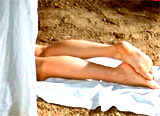  First Glimpse of Juliette (Brigitte Bardot)   Juliette With Antoine  The Mambo Scene |
|||||||||
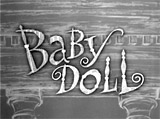
|
Tennessee Williams' play was adapted by controversial director Elia Kazan for the pot-boiling Southern drama Baby Doll (1956) - harshly condemned by the Catholic Legion of Decency for its depiction of older aged men pursuing an under-aged female. It told about a thumb-sucking, white-trash, 19 year-old 'Baby Doll' child bride (Carroll Baker) - she was married (without sexual consummation) to cotton gin operator Archie Lee Meighan (Karl Malden). In the film's opening, Baby Doll slept in a small crib-bed while sucking her thumb as the desperate, sexually-frustrated Archie peeked at her through a hole in the wall (and thrust with a penknife to make the hole wider - as her mouth opened and closed around her thumb). During another blatant sequence that took place in town, Baby Doll pleasurably licked an ice cream cone. The film's most notorious, highly-sexual seduction scene was severely criticized - but mostly for what was not shown just below the camera's frame. Baby Doll's seduction was conducted on a plantation swing by vengeful, covetous Sicilian Silva Vaccaro (Eli Wallach). One of his aims was to 'take' the virginity of Baby Doll and deflower her to get back at her husband. Although he didn't succeed at first, he was able to kiss her on-screen in a darkened adjoining room under a turned-off bare bulb while Archie was on the phone nearby. Later, in a memorably lewd sight - Vaccaro mounted and sat astride a small wooden hobby horse - rhythmically rocking back and forth on the tiny toy whose head was hardly visible between his legs - gyrating back and forth to the raunchy accompaniment of the rock song "Shame on You." He pursued Baby Doll through the house (and in one instance - generally considered in bad taste by critics - when he tickled her as she squirmed on her back by rubbing her stomach with his shoe) and up to the attic to get her to sign a statement about Archie Lee's arson. |
  Baby Doll (Carroll Baker) in Crib  Baby Doll on Swing    Baby Doll with Silva Vaccaro (Eli Wallach) |
|||||||||

|
Bus Stop (1956) This Joshua Logan film was adapted by George Axelrod from a play by William Inge. It told about an innocent rodeo cowboy named Bo (Don Murray) who fell in love with dim-witted cafe singer Cherie (Marilyn Monroe). Cherie sang an off-key, inept, but innocently sensual rendition of "That Old Black Magic" in the Blue Dragon - a run-down honky-tonk night-club in Phoenix. At the end of the number, she turned a red spotlight on herself to look "aflame." The passionate kissing scene between Bo and Cherie had to be reshot after major filming had ended - it was common knowledge that censors routinely cut love scenes in films with open-mouthed kisses. |
  Cherie (Marilyn Monroe) Singing in Night-Club  Cherie with Bo |
|||||||||
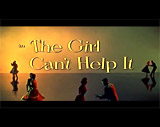
|
The Girl Can't Help It (1956) Frank Tashlin's mid-50s film starred buxom (42DD) blonde bombshell Jayne Mansfield in her best-remembered film at a time when she was competing for top honors with another blonde sexpot, Marilyn Monroe. It was filled with ribald sexual humor (racy for its time) and the display of Mansfield's exaggerated hourglass figure that both brought battles with the Production Code Administration. Mansfield starred as curvaceous aspiring, no-talent blonde moll Jerri Jordan (real name Georgianna), retired ex-slot machine mobster Marty "Fats" Murdock's (Edmond O'Brien) girlfriend/fiancee. Alcoholic, bankrupt publicity agent Tom Miller (Tom Ewell) was hired for $10,000 to attempt to train her to be a rock 'n' roll singing star in six weeks in this spoof of the record industry. Murdock told Tom: "I'm putting her in your hands, figuratively speaking." Tom was unsure he could transform her so quickly:
A former cartoonist, Tashlin inserted outrageous, saucy sight-gags into the film, and named his two main characters Tom and Jerri. As curvaceous Jerri (wearing a tight-fitting dark blue dress and broad-rimmed hat) walked down the street (swiveling her hips to the tune of "The Girl Can't Help It"), the ice in a delivery man's truck immediately melted, and when she climbed the steps of an apartment stoop past a milk delivery man, the bottle he was holding popped open and spurted out frothy milk (an ejaculatory image). Inside the building, another man's glasses cracked (all to the tune of Little Richard's "She's Got It") at the sight of her climbing the stairs. When she first met Tom, she held up two glass bottles with fresh milk to her gigantic, well-endowed chest - one in front of each breast - an obvious visual gag. At breakfast with him after declaring she only wanted to be happy by keeping house and raising a family: "I'm domestic," she provocatively leaned forward to assert to her recently-hired press agent Tom that she felt ready for motherhood: "But everyone figures me for a sexpot, no one thinks I'm equipped for motherhood!" Tom took Jerri to a succession of nightclubs, to show off her appeal in a sexy, form-fitting red dress. He timed her sashaying walks to the powder room for maximum effect. By the end of the film, basically a love story, she revealed that she really had singing talent and also that she truly loved Tom - whom she married in order to have children. |
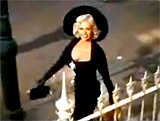  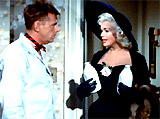 Jerri (Jayne Mansfield) With Two Milk Bottles   Jerri with Tom (Tom Ewell) |
|||||||||
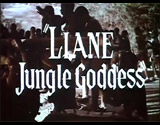
|
Liane Jungle Goddess (1956, W. Germ.) (aka Liane, das Madchen Aus Dem Urwald) The "adults only" adventure fantasy, based upon the Tarzan films, was shot in Agracolor. The film's tagline sensationalized the plot:
[Note: The film's sequel was Nature Girl and the Slaver (1957) (aka Jungle Girl and the Slaver).] Blonde teenaged Liane (16 year-old Marion Michael) was discovered by a German expedition in the jungles of Africa, where she was worshipped as a goddess by a native tribe.
Liane was a topless, G-string bikini-wearing teenager, who was adept at climbing ropes, swinging on vines (into a small pond for swimming), and battling foes. Although she was always half-naked in the jungle scenes, her perky breasts were mostly obscured by her long-flowing blonde hair and the pet lion cub she held in her arms. However, there were other views of similarly-naked African native girls (even under the opening credits).
The roadshow, drive-in film became less interesting when she was caught in a net, and soon taken to Hamburg - it was thought that she was the grand-daughter of a German millionaire ship tycoon Von Amelongen. |
 
Bare-Breasted Natives |
|||||||||

|
Tea and Sympathy (1956) Director Vincente Minnelli and MGM brought playwright/screenwriter Robert Anderson's hit Broadway play to the screen with a watered-down, almost sexless, yet still bold story - completely reflective of its repressive era in the mid-50s. The controversial, highly-edited film was one of the first key films dealing with teenage homosexuality and fitting in, without playing to obvious stereotypes. Portrayed as a lengthy flashback (at the time of a Chilton School reunion ten years later attended by the protagonist), the film told about sexually-confused, effeminate (delicately featured) and misunderstood prep-school student Tom Lee (25 year-old John Kerr). Words used to describe him did not include "homosexual" (the word was forbidden by censors) although other derogatory, ostracizing and mocking terms were used: "strange" and "off-horse," for instance, and rowdy 'manly' boys on campus bullied, tormented and dubbed him "Sister-Boy." Although he was a tennis pro, he also enjoyed sewing (taught to him by a maid when he was five), gardening, and reading, and he took a part in the school play A School for Scandal requiring him to dress up in a woman's dress for the part of Lady Teasdale. He also liked guitar playing (and singing) and folk music, rather than dating girls or playing football on the beach. His divorced father Herb (Edward Andrews) was both ashamed of his son, and coercive and demanding - wishing Tom would pursue more masculine (macho) activities and interests. Tom refused to get a fashionable crew-cut ordered by his father - the style preferred by other males. He found the most sympathetic ear in the person of his housemaster's wife, patient and understanding housemother Laura Reynolds (Deborah Kerr), at a time when his socially-accepted, athletic roommate Al Thompson (Darryl Hickman), who often defended Tom, was planning on moving to a new dorm the next year. In a prominent scene set in a music room adorned with statue busts and instrument stands, Al attempted to show Tom how to walk in a more virile fashion. With problems in her own troubled one-year emotionless marriage to Bill Reynolds (Leif Erickson), an athletic coach and an avid outdoorsman, the love-starved and refined Laura befriended Tom - risking her marriage. [She saw in Tom similarities to her first young husband, who foolishly proved how courageous he was - and was killed in the war.] She blamed Bill for standing by as Tom was humiliated, while he insisted on rigid codes of manliness. Laura provided a new definition of manliness:
To prove his worth and heterosexual preference, a pressured Tom went on his first date with 'easy' soda shop waitress Ellie Martin (Norma Crane), who was known to have a bad reputation, but he was awkward, jumpy and nervous in her presence. When she asked him to dance and felt his soft girly hands, she insulted him by using his nickname "Sister-Boy." Ashamed, he reached for a knife in her kitchen drawer and became suicidal, before being apprehended by campus police and threatened with expulsion. Laura reached out to Tom to support his personal struggle, and had tried to be humanly nice to him without pity. (She had earlier blamed her husband for imposing misery upon Tom: "Last night, I know what Tom had in mind to do...I knew what he was going to do, and why he was going to do it. He had to prove to you bullies that he was a man and he was going to prove it with Ellie Martin. Well, last night, I know this is a terrible thing to say, but, last night, I wish he had proved it with me.") She also admitted to Bill that she was "miserably lonely." In the most infamous scene set in the woods, Laura found Tom and assured him: "That was the nicest kiss I ever had from anyone." (She was referring to his attempt to kiss her the night before, when she seemed to rebuff him.). She offered herself to him for another kiss, to prove that they could both show affection toward each other. She told him, as she held his face in her hands:
Although not shown, it was implied that Tom resorted to an affair with a transgressive Laura to be 'cured' of his sensitive nature, and to help her fulfill her own needs. The film's main revelation, 10 years later in a tacked on epilogue (part of the framing technique), was that Bill had supported Tom's persecution because he himself was really a self-hating, closeted gay. The Reynolds had broken up - the consequence of Laura's indiscretion. Presumably, Laura had suffered afterwards for her adultery, as the repressive censorship code required. The film ended with a voice-over from Laura in an appreciative letter that she never mailed to Tom:
It was implied that homosexuality was not endorsed - Tom was now happily married, but Laura had suffered the breakup of her marriage. |
   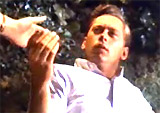 
The Kiss Between Laura (Deborah Kerr) and Tom Lee (John Kerr) |
|||||||||

|
The Violent Years (1956) Director Ed Wood, Jr. wrote the screenplay for this cautionary, exploitative B-movie thriller - tauted by the film's narrator as documenting events from "today's glaring headlines." The hour-long film told about female teenage/juvenile delinquency involving a menacing girl gang sometimes dressing up as men. They also called themselves by male names:
They committed gas station robberies, held make-out petting pajama parties, and vandalized school property. During one of the petting parties, uninvited adult guest Barney Stetson (Glenn Corbett) from the office of Paula's father pointed at a particularly amorous couple nearby - as he looked past Paula's own pajama-covered breasts. He remarked: "That's a cute pair," with her salacious and tart reply: "They have their points." The film was noted for its preposterous "male rape" scene in which the four spoiled 'bad girl' friends criminally attacked, at gunpoint, a young couple named Johnny and Shirley, who were making out in a convertible. They accosted the lover's lane couple, bound and gagged the female with her own torn-up skirt, and then ridiculed the "pretty boy" male for only having $11 to rob: "Maybe he's got more to offer than his money?" The four girls led him to a secluded woodsy area and began to undress him. Paula approached forward to 'rape' him (off-screen), as she began to remove her sweater. The Daily Chronicle headlined the crime in the next scene:
As the film ended after teenaged Paula's increasing criminal "thrill-seeking" activity and "utter disregard for life itself," the innocent-looking girl was charged with first degree murder and found guilty. She was sentenced to reside in the state penitentiary for women (after the age of 21) to serve a life sentence. She remorselessly shrugged off her life ("So what?"). She died in prison giving birth to a girl, after she had asserted: "I don't want my baby in a place like this." |
    
Paula (Jean Moorhead) |
|||||||||